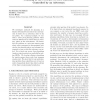Free Online Productivity Tools
i2Speak
i2Symbol
i2OCR
iTex2Img
iWeb2Print
iWeb2Shot
i2Type
iPdf2Split
iPdf2Merge
i2Bopomofo
i2Arabic
i2Style
i2Image
i2PDF
iLatex2Rtf
Sci2ools
106
click to vote
ICML
2003
IEEE
2003
IEEE
Planning in the Presence of Cost Functions Controlled by an Adversary
We investigate methods for planning in a Markov Decision Process where the cost function is chosen by an adversary after we fix our policy. As a running example, we consider a robot path planning problem where costs are influenced by sensors that an adversary places in the environment. We formulate the problem as a zero-sum matrix game where rows correspond to deterministic policies for the planning player and columns correspond to cost vectors the adversary can select. For a fixed cost vector, fast algorithms (such as value iteration) are available for solving MDPs. We develop efficient algorithms for matrix games where such best response oracles exist. We show that for our path planning problem these algorithms are at least an order of magnitude faster than direct solution of the linear programming formulation.
Related Content
| Added | 17 Nov 2009 |
| Updated | 17 Nov 2009 |
| Type | Conference |
| Year | 2003 |
| Where | ICML |
| Authors | H. Brendan McMahan, Geoffrey J. Gordon, Avrim Blum |
Comments (0)

